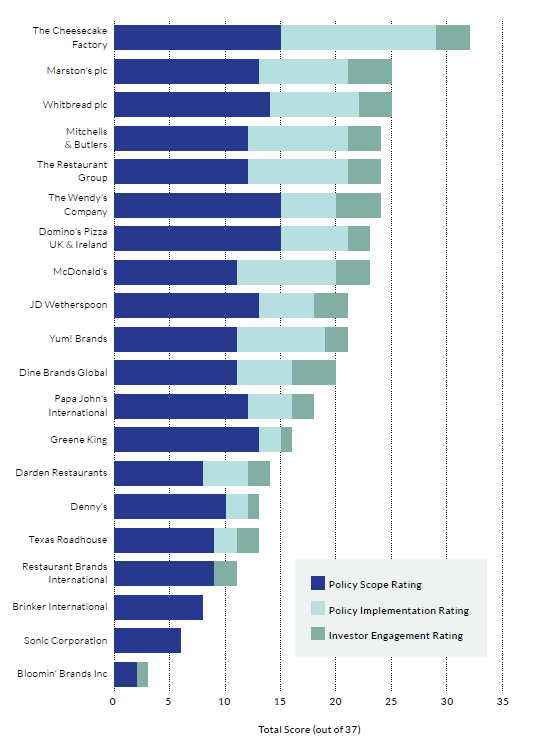At the end of July, Taco Bell, the Mexican-inspired brand of parent company Yum! Brands (NYSE: YUM) announced a new commitment focused on reducing the use of medically important antibiotics to human health in its US and Canadian beef supply chain by 25% by 2025.
Back in May this year, FAIRR benchmarked the corporate practices of the 20 companies in its collaborative investor engagement (see Figure 1). Yum! Brands was ranked 10th out of 20 global quick service restaurant companies as a result of the company’s single species focus and limited reporting on implementation progress including disclosure of antibiotics use.
Yum! Brands first developed its global policy in 2017 to reduce and eliminate the use of medically important antibiotics in chicken, which is supported by brand specific commitments. However, the company had made limited efforts to move beyond chicken despite being a major purchaser of beef through its Taco Bell brand[1], and being subject to increased investor pressure including a shareholder resolution in 2017.
This commitment by Taco Bell makes Yum! Brands the third company in FAIRR’s collaborative investor engagement, to make a time-bound commitment to curb antibiotic use in its beef supply chain. McDonald’s announced at the end of 2018 its commitment to eliminate medically important antibiotics by 2022 in over 85% of its beef and dairy beef supply chain_._ Wendy’s also made a commitment to source 15% of its beef from a group of producers that have committed to a 20% reduction in the use of a medically important antibiotic.
As global fast food restaurant chains move towards curbing use in their beef supply chains, the message to the market is loud and clear: the beef industry is next. Our analysis of the largest publicly listed beef suppliers indicates that very little action has been taken to manage antibiotic use in cattle. The results of the Protein Producer Index will be released on the 4th September, but so far our assessment shows that only 1 of 16 beef producers in the Index has committed to phasing out the routine use of antibiotics.
Those suppliers that are taking some action, are likely to benefit from a competitive advantage as global meat buyers like Taco Bell state that they will give preference to those that are actively working to reduce antibiotics use. However, meaningful change will require Taco Bell to verify supplier adherence through data collection on antibiotics use and the use of third-party audits.
For over three years, and with the support of 74 investors representing $4.9 trillion in combined assets, FAIRR has been engaging with 20 companies in the global fast food and casual dining sector including Yum! Brands and McDonald’s. Company awareness and recognition of the impacts associated with the overuse of antibiotics has increased dramatically since the start of the engagement. This has been partly driven by investors who are integrating antimicrobial resistance into investment decision making across asset classes to mitigate risk across investment portfolios, protect long-term value and ultimately public health.
Figure 1 Benchmarking corporate practices on antibiotics stewardship

[1] Taco Bell is Yum! Brands second largest brand by revenue after KFC generating approximately 36% of total revenue in 2018. It is also one of the largest purchasers of beef in the US serving 290 million pounds of ground beef every year. http://citizenship.yum.com/planet/animal-protein.asp
FAIRR insights are written by FAIRR team members and occasionally co-authored with guest contributors. The authors write in their individual capacity and do not necessarily represent the FAIRR view.
